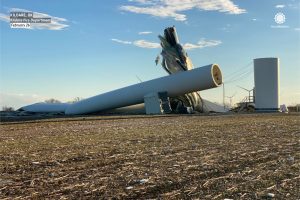
Just because the idea of wind and solar farm setbacks failed to become law in the recent Oklahoma legislative session doesn’t mean the issue has died for good. The same applies for another controversial item that didn’t become law—the application of Human Biosolids on farmland and other sites.
Both topics will be raised at an upcoming hearing to be held by the State Senate Energy Committee. It will be held Wednesday, September 3 at 9 a.m. in Senate Room 230 of the State Capitol Building.
“Furthermore, politics, misinformation and petty personal agendas have co-opted the debate on this bill, resulting in senators being harassed and making it nearly impossible to have a serious, rational policy discussion on this bill and other wind energy regulations this late in session.”
The second controversial issue to be brought up later in the day will focus on the use of human biosolids or waste as farm fertilizer. Sen. Randy Grellner, R-Cushing, wants a discussion of failed efforts in the recent legislative session or new attempts perhaps in the coming legislative session. The topic will be discussed at 3 p.m. and no specific bill was included in the agenda.

However, the issue was the target of SB3 by Sen. Green and Rep. John George in the concluded 2025 session.
“Oklahomans pride themselves on being good neighbors, but the stench from biosolid fertilizers and the swarms of flies invading homes are anything but neighborly,” Green said at the time. “Every resident deserves to feel comfortable and safe in their own home, and Senate Bill 3 is a crucial step in safeguarding that right.”
He also raised the issue of whether such biosolids might contain “forever” chemicals.
“Sewage sludge and biosolids pose a serious threat to Oklahoma’s water and food supply, and as a conscientious agricultural producer, I simply cannot stand by and allow the continued use of these toxic materials,” Green said.
The bill received Senate approval but in the House, was referred to a committee and no final vote was held on the measure.
“To protect the health and safety of the people of Oklahoma,
a moratorium is hereby established on land application of sludge and biosolid material in this state until July 1, 2028. On and after
the effective date of this act, the Department of Environmental
Quality shall not issue or renew any permit for the land application of sludge or biosolid material and all active permits shall be revoked until July 1, 2028,” stated the measure.

